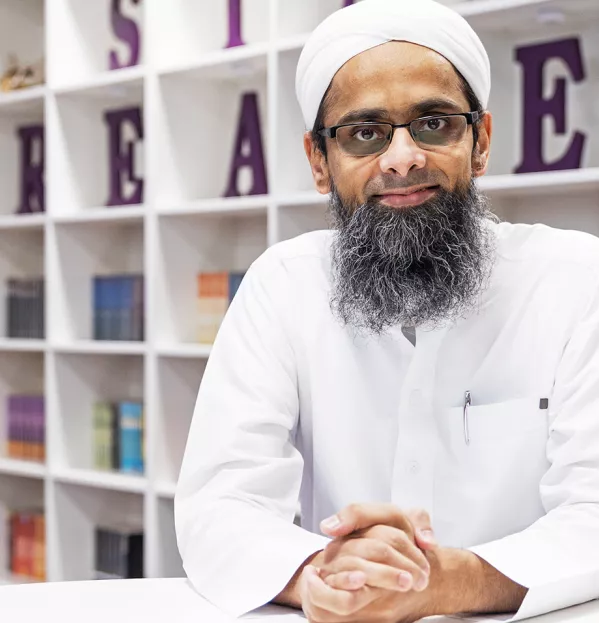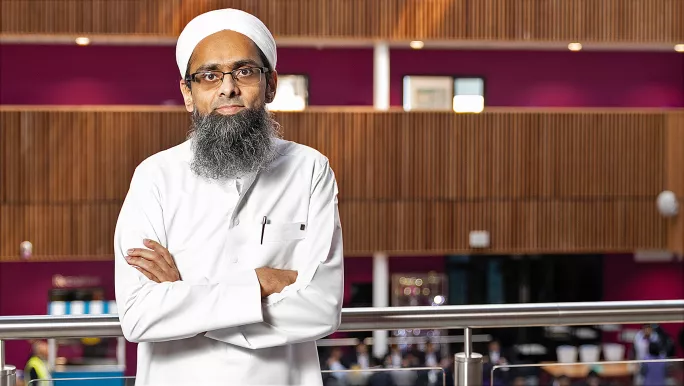
10 questions with... Sir Hamid Patel

Sir Hamid Patel is the CEO of Star Academies, a multi-academy trust (MAT) formed of 31 schools across Lancashire, West Yorkshire, Greater Manchester, West Midlands and London - a role he has held since its formation in 2010.
Prior to this he served as executive principal of Tauheedul Islam Girls’ High School in Blackburn and was the director of strategy, change and external relations at Bradford College.
He also works as a Department for Education national leader of education and serves as a board member of Ofsted and the Confederation of School Trusts.
He spoke to Tes for our 10 questions series to reflect on his time in education and the teachers that inspired him, explains why he is a firm believer in the power of MATs as a force for good and discusses the importance of educators never forgetting their own inner child as they teach the next generation.
1. Who was your most memorable teacher and why?
In primary school, Mr Silson stood out because he nurtured my self-belief by giving me opportunities to speak in assemblies and take a comedic role in dramatic productions.
I was one of a small number of Asian pupils at my school and he made sure I wasn’t overlooked. He gave me a taste of leadership by supporting my campaign to be the captain of Kipling house - a very prestigious role! Mr Silson combined a reputation as the strictest teacher in the school with a brilliant capacity to discover and develop individuals’ talents.
During my first 18 months in secondary school, I waited patiently during assemblies where merit certificates were ceremonially handed out for achievement and effort.
My disappointment at not receiving one was profound until my maths teacher, Mr Chorlton, gave me my first prized award. This small act helped me overcome my sense of being “lost” in a large establishment. I remember the enormous pride that his praise gave me: recognition was definitely a motivator.
Like thousands of Muslim children, I attended mosque in the evenings and at weekends, and spent many hours learning the Qur’an. My teacher, Imam Haroon, was the model of ultimate patience as he coached me to achieve precision with every syllable.
He showed me that there is no substitute for hard work, but with practice and determination, daunting goals are actually achievable.
2. What were the best and worst things about your time at school?
Teachers set the tone for my learning, forged my character and shaped my future. I did not realise it at the time, but the best thing about school was the teachers and the worst thing about school was the teachers.
The very best ones were selfless, knowledgeable and inspiring. They made education magical. We hung on to their words and excelled in their subjects.
In retrospect, some teachers had the opposite effect. The worst ones didn’t bother to plan lessons. Instead, they joked and connived with the class ringleaders who weren’t bothered about getting work done either.
Some prided themselves on teaching the pupils who gathered eagerly at the front of class while ignoring those who displayed their non-interest by gravitating to the back row.
3. Why do you work in education?
Why would I work anywhere else?
I want to have the same lasting impact on young people that my best teachers had on me. Education is about creating the future, smashing glass ceilings and transforming lives.
It’s about seeing young people from poor and troubled backgrounds getting into university or prestigious apprenticeships and succeeding in great careers so that they can change the fortunes of the towns they grew up in.
Everything starts with education. Our aspirations for a powerful knowledge economy or a world-beating national health service depend on the quality of education we provide.
4. What are you most proud of in your career and what do you regret?
Presentation evenings are major events in Star schools, and I relish every moment of them, partly because I’m intensely proud of our children’s achievements and qualifications, but also because I love to hear them speak about their own experiences of school. They amaze me.
I’ve watched them grow from small children into brilliant young adults with a world of opportunity open to them.
My regret is for any pupil who has not felt this positive transformation.

5. Who would be your colleagues in your perfect school staffroom?
As a society, we have become obsessed with heroes. I’m really not a fan of celebrity culture, so I will avoid naming individuals.
The best staffrooms are full of colleagues who believe in the potential of young people, have a strong work ethic, unfailing humanity, deep humility and commitment to teamwork. Some will be loud and vivacious and others will be quietly unassuming, but together they will make the organisation sing.
6. What would you say are the best and worst aspects of our school system today?
Schools have undergone a seismic shift over the last 20 years. There has genuinely never been a better time to be a pupil than now. Schools are more vibrant and dynamic than ever before.
Investment in teacher education has brought huge benefits. There’s a rich ecosystem focused on improvement.
The growth of MATs as specialist education charities is a positive change. While we still need time to see the full benefits that trusts bring, we need to maintain the impetus to remove the inequalities, inefficiency and incoherence that characterise two-tier public education (arguably one of the worst aspects of the current system).
There have been many good local authorities, but education has only been one element of their vast remit and they have never had sufficient power to intervene in a timely way in their schools: MATs, working in partnership with them, can redress the balance.
Many of the corrosive factors that affect the sector are beyond schools’ control. Lack of access to Camhs, under-investment in youth provision, limited availability of children’s social care to support families in crisis and inadequate resources to support pupils with special educational needs or disabilities all make schools’ jobs more difficult.
Addressing these problems is the key to ensuring that schools can do their best to make learning challenging and memorable for all pupils.
7. Your own teachers aside, who in education has influenced you the most?
Many educational thinkers have influenced me - E. D. Hirsch, Doug Lemov, Tim Brighouse, Michael Fullan, Paulo Freire and Daniel Goleman, to name but a few. It’s important to consider different perspectives.
In a world dominated by social media, it is too easy to be compelled by a binary approach and become either a follower or a detractor. One of the strengths of the sector is the array of thinkers whose insights inform our policies and practice.
8. If you became education secretary tomorrow, what would be the first thing you would do?
We run schools in some of the communities of our country that are predominantly white working class.
These are often forgotten communities with some of the most challenging circumstances - serving families that are often struggling to make ends meet, lacking the wraparound social and health care support to help parents, and with very little business investment.
I would lead a comprehensive cross-government strategy for these communities - making it compulsory for the best local school to pair with the worst; offering tax breaks to encourage businesses to offer apprenticeships to local children; and funding social workers, health care professionals, charities and Citizens Advice provision in each school.
I would also incentivise the best-proven teachers to teach in the most challenging schools in these areas. A whole-society approach to these communities, centred around the most challenged schools in these areas, has to be a top priority.
9. What will our schools be like in 30 years?
Our schools have become much more impressive over the last two decades. During the next 30 years, they will be increasingly innovative and responsive organisations, reflecting the changes that will occur in wider society.
Some things will be the same. We will still have teachers, knowledge-rich subjects and buildings. There will be timetables to organise learning. Character development will still be an important aspect of school life. Schools will still be organised in groups and the workforce will be fully professionalised.
Schools will be smarter, enabled by advanced digitisation. We will see net zero, green campuses that create renewable energy and are healthy spaces for learning.
Artificial intelligence will enable a more personalised curriculum through programmes that respond to individual pupils’ skills and design interventions for them. Digitised assessments will be the norm.
Robot teaching assistants will be established in classrooms, supporting children and communicating in real time with their parents. Textbooks will be replaced by digitised software that is regularly updated.
The metaverse will be central to children’s experience, enabling them to be immersed in virtual reality that builds their cultural capital - but we cannot allow it to become a proxy for life.
Of course, such transformation must be inclusive. Levelling up means that all families in the nation’s cold spots need access to the digital infrastructure.
There will be challenges, too. Young people’s mental health needs will not be addressed by technological advances; human interaction will need to remain as the beating heart of the system. And we will need to ensure that we remain smarter than the technology.
I’m still optimistic that the best is yet to come.
10. What are the most important lessons you’ve learned from doing this job?
I have learned that there are no quick fixes. Any career in education is about managing the long haul, developing resilience and adhering to inalienable principles.
My advice to others, based on my experience, is to stay focused on what you want to achieve. Work hard to realise your goals and stay true to your values.
Don’t be seduced by accolades or dispirited by critics. Retain a sense of optimism - an unswerving belief that the best is yet to come.
Draw strength from your faith, if you have one, and your family. Never forget the child you once were, who still resides within you.
You need a Tes subscription to read this article
Subscribe now to read this article and get other subscriber-only content:
- Unlimited access to all Tes magazine content
- Exclusive subscriber-only stories
- Award-winning email newsletters
- Unlimited access to all Tes magazine content
- Exclusive subscriber-only stories
- Award-winning email newsletters
You need a subscription to read this article
Subscribe now to read this article and get other subscriber-only content, including:
- Unlimited access to all Tes magazine content
- Exclusive subscriber-only stories
- Award-winning email newsletters
- Unlimited access to all Tes magazine content
- Exclusive subscriber-only stories
- Award-winning email newsletters
topics in this article



